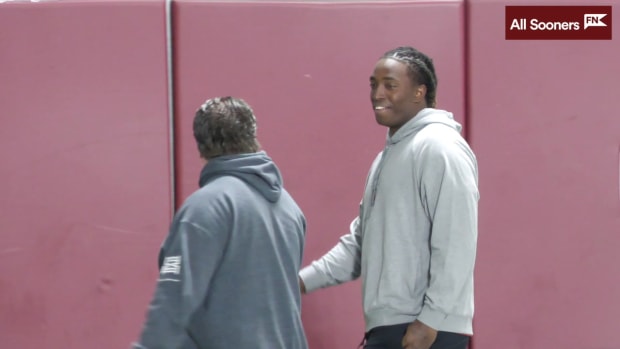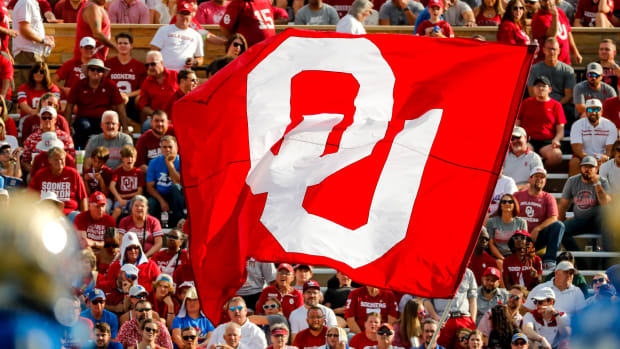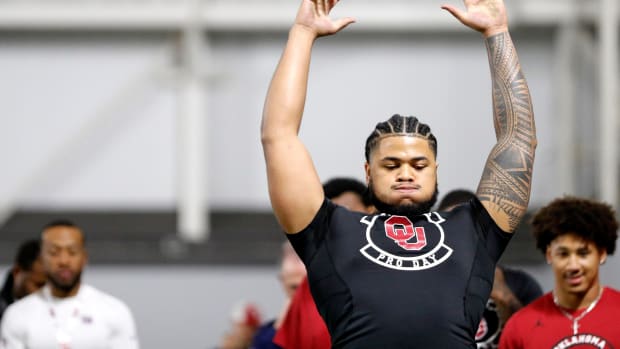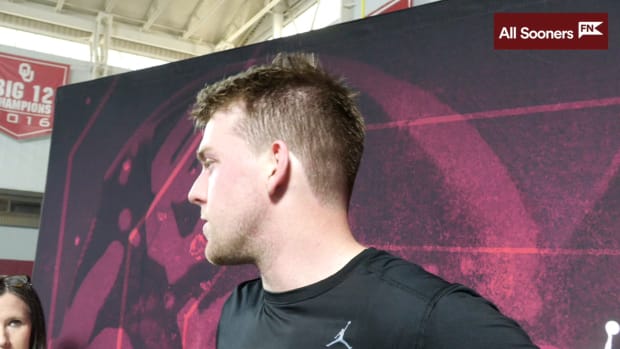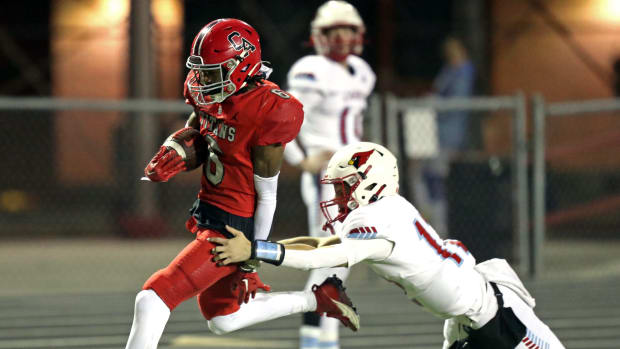Lincoln Riley on Regret: 'We Have to Do a Better Job'
The harsh reality is this: Lincoln Riley faced an impossibly difficult decision.
He could have cut his football team loose and let them head away to parts unknown last week and faced the consequences of potential positive COVID-19 cases on the Oklahoma football team.
Or he could have kept the players sequestered indefinitely and risked doing the kind of damage that doesn’t reveal itself from a cotton swab.
He chose the former, and now the Sooners’ fourth-year head coach is paying that price: After four weeks with zero positive results (a streak that was broken last week with one positive), nine players tested positive, and a handful of others have been quarantined for contact tracing.
Riley said Saturday during a video press conference, “It’d be pretty easy for me to say now that I regret it,” but he also said he saw something in his players before deciding to turn them loose that concerned him just as much.
“You get thoughts in players’ minds, — which I totally agree with and absolutely understand — of, ‘Why am I out here risking my my body if I don’t even have a Big 12 schedule out? I don’t even know if our conference is gonna play football,’ ” Riley said. “And that was part of the reason we shut it down here. Without a doubt. Not that we were getting pushback from our players, they’ve been great. But you could just feel that. And I get it.”
Needing a break from preseason training camp is one thing. Players and coaches chant every year that they’re tired of practice, they need a change, and they can’t wait to hit someone wearing a different colored uniform. That makes sense. The monotony of football practice, or preseason in any sport, can be overwhelming and exhausting mentally.
That’s why so many programs insert some kind of team-bonding getaway, or try to break up the mundane with military-style challenges or ropes courses, etc.
But this is different. The specter of potentially not even having a season had begun to take its toll on players. That specter still looms, certainly, but the cessation of camp activities last Friday, followed by Tuesday’s news that the Big 12 was forging ahead with 2020 and actually released a revised schedule, has given the players a fresh perspective on what has been an otherwise bleak offseason.
It has given them hope.
“I would say before we had a schedule and, kind of as this uncertainty hit a boiling point in the last several days, it definitely affected (players’ mental health),” Riley said. “There’s no question about it.”
Riley said he was “talking through” ideas with athletic director Joe Castiglione and told his boss that his team’s emotional well-being “was my ultimate decision on it. We were gonna give ‘em time (off) regardless, but to do it when we did it was based on, I don’t feel like it’s right of me to go out and practice our guys — and football is a risky sport in any time period — not even having a schedule and not even knowing we’re gonna play.
“I do believe now, having a schedule, knowing that the Big 12 Conference has a plan to move forward towards a season, has helped that, and it’s given some clarity and some direction, which our players needed, no question about it.”
Castiglione’s application to the NCAA for a waiver to move the Sept. 5 season opener against Missouri State up a week to Aug. 29 was made with the intention of spreading out the schedule, creating a larger target in which to play the season in case the need arose for postponements. Having extra weeks built in was the right decision, given the information at the time. It would have allowed Riley greater cushion to manage positive COVID tests on his roster.
But ultimately, stretching out the season also stretched out the preseason. Now the Sooners aren’t playing until Sept. 12, and Big 12 play isn’t scheduled begin until Sept. 26.
“We knew once the decision was made at the Big 12 level to back the season up, and ultimately backing our Missouri State game up a couple of weeks, we knew and certainly didn’t feel it was gonna be the right thing to go six-and-a-half or seven straight weeks of training camp before you play a game. So we knew at some point we were gonna need to give our guys a break.
“We were honestly planning on doing it a little bit later than what we did, but that news changed it.”
The real pressure cooker came when reports surfaced late last week that the Big Ten Conference and Pac-12 Conference would meet on Monday and likely cancel their seasons, as well as reports elsewhere that various FCS conferences and some FBS teams were shutting it down.
That created an uncertainty among teams nationwide that suddenly, players who had been practicing for a week, or working out for three weeks, no longer saw a finish line.
So, he gave them a break.
“The other factor to us in going ahead and doing that earlier rather than later,” Riley said, “was feeling like if we did have anybody come back and test positive for COVID or have anybody get dinged on a contact trace, it gave us plenty of time to handle those situations, get those guys isolated (and) back with the team, hopefully if everything goes to plan, certainly in time for getting ready for the season.
“We felt like it was the right decision at the time.
“One, it’s disappointing. Two, it’s an opportunity for us to continue to learn and educate ourselves. This isn’t the NBA. This is college football. We can try to minimize these risks as much as we possibly want, but we’ll never be able to eliminate them 100 percent. We don’t have a bubble.
“So we get that we’re all gonna have to continue to work to do a better job on all accounts. We’re still very confident in the plan that we’ve had. We still reference almost a month-long period of success when our players were here every day that we went through and we were able to substantially minimize positive tests.”
Does Riley have regrets? Of course he does. Nine more of his players now have contracted a virus that has killed three-quarters of a million people worldwide and nearly 170,000 Americans. Sure, they’re young, they’re strong, they’ll likely recover soon and will be just fine and will not experience any lingering complications.
But that’s what Indiana offensive lineman Brady Feeney thought, too. The virus seems to have its own rules.
“That’s a hindsight decision. It’d be pretty easy for me to say now that I regret it,” Riley said. “I also feel like if I keep a team hemmed up here for a six- or seven-week training camp, that I’d regret that, too. I think the reality is, our players are not gonna be in this facility all the time. That is the reality. We don’t have a bubble. We don’t have a hotel that we can put them in and not let them out other than go to class and come here.
“So for us, it’s gonna be we as a staff, we as a team have to do a better job of educating and mitigating as much as we possibly can when they’re outside of this facility.
“It’s got to be a learning experience for us.”
To get the latest OU posts as they happen, join the SI Sooners Community by clicking “Follow” at the top right corner of the page (mobile users can click the notifications bell icon), and follow SI Sooners on Twitter @All_Sooners.
